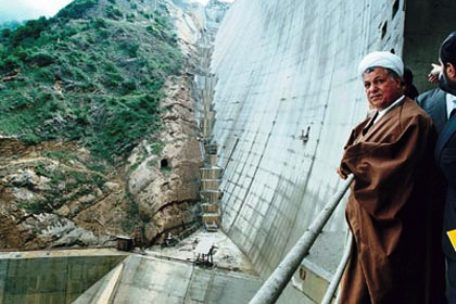The Ayatollah's Dreams

Lets focus on the people of Iran. Although we have come a long way since the Amir Kabir era, many people, including myself, do agree with the opinion of a number of Iran’s leading sociologists that ‘the Iranian society kills its elites’. When you took office in Iran you sought to establish a technocratic system of governance and to spark an industrial and economic revolution in the country. How do you evaluate this proposition, and the Iranian society’s attitude?
HR: People were at the heart of our revolutionary movement in 1979 and they welcomed any development in the country. At those days, construction of every school or initiation of an agricultural or industrial project received enthusiastic welcome. People are our source of hope.
Yet, when my time in office was over I believed that some of the key projects I had in mind would not be materialized by future administrations and they would probably give priority to other concerns. So I tried to at least initiate some of those projects I had in mind in the hope that if I did not manage to finish them, someone else would. After twenty years, there are yet some unfinished plans. I tried to make sure that I did all I could, or at least ensure the starting of transformational projects.
So you did not see people as a barrier to reform and development. Would it be correct to say that other senior officials hampered the process of development?
HR: The majority of Iranians are dedicated people who understand and appreciate our efforts in setting up and strengthening the country’s infrastructure. Yet, of course there were groups who at the time were expecting to see changes only on the surface and the day-to-day procedures.
For instance, after applying resources to construct the 15th of Khordad Dam near the city of Qom, we faced criticism for the country’s inflation rate and the high price of certain commodities. At the inauguration ceremony of the dam I stated that we had spent millions of the government’s resources on building this dam and that I would have probably dealt with less criticism if I had spent the money on subsidizing certain commodities for Qom’s residents, yet I said I am committed to move towards constructing the future of this country and do not want to entirely focus on short-term remedies. We had to construct and manufacture to ensure the security of the current as well as future generations. It was this outlook of mine that was criticized most often.
Do you find Iran an underdeveloped country?
HR: Yes. Of course, we are considered a developing country, yet greatly lagging behind most developed countries while our country holds rich resources. I remember studying the potential possibilities and resources of other countries in the world and I believe there are only a few countries with similar set of possibilities and natural resources as Iran: The US, Russia, and Canada. Iran has an impressive collection of natural resources. We have the four seasons in our large country and unique climate in each region. Iran borders two seas at its north and south [the Caspian Sea and the Sea of Oman]. We are also at the center of one of the world’s major crossroads. One thing that I still regret is that we had the opportunity to become transit route for the world’s gas and oil pipelines. From north to south and east to west we could have become the crossroad of optical fibers. The four corners of our country could have been used as air corridors and flight routes. Airplane routes through Iran’s airspace would have been extremely profitable for Iran’s economy. Further, Iran could have been an ideal location for transit passengers and airplane refueling. Our country has great potentials, some of which is still undiscovered. We have the means to become one of the richest countries in the world considering our relatively small population and vast and valuable natural resources.
This brings us to my next point. Iran and its dwellers are blessed with great talent and potential, yet historically there have always been great obstacles in our progress. As someone who has been in office for years and has fought for progress, how would you explain this historic struggle?
Although Iran has never officially been another country’s colony, centuries of foreign intervention and tyranny have greatly slowed the country’s development. Colonialism continuously sought to keep Iran dependent to a certain degree, by buying raw material from our country and reselling derivative products to us, sometimes as much as 10 times the price of the raw material. After the Islamic Revolution, however, this mechanism was abolished. But the country got involved in 10 years of war and chaos, followed by international sanctions that were the result of our unfriendly relations with the international community. One of my administration’s major undertakings was to deescalate tension in our relations with other countries by taking a more neutral stance and stating that Iran wants no enemies. This policy helped build up better international relationships, which resulted in low-interest loans and the import of technology.
Following the war, the country’s oil revenue was about seven to eight billion dollars annually. We received loans from foreign parties for our development plans, and would then repay the initial loans through the income gained from these projects. There were also times that we would have to renew the loans due to unforeseen circumstances. We were rapidly improving the country’s condition. Ayatollah Khomeini also helped us by issuing Iran’s reconstruction and development policy.

